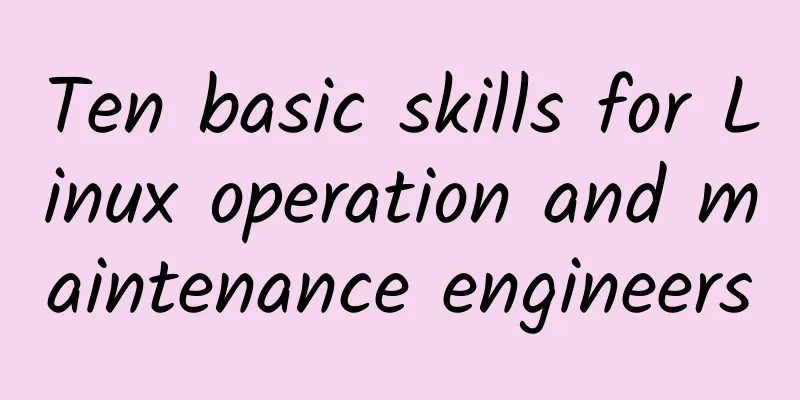Ten basic skills for Linux operation and maintenance engineers

|
I am a Linux operation and maintenance engineer and have some experience in this area. Now let me talk about which tools I need to master! When it comes to tools, people outside the industry can say they are skills, but within the industry we generally call them tools, which are tools that must be mastered for operation and maintenance. I will just roughly list these aspects, so that you will have no problem getting started. If you want to learn Linux system, you can choose redhat or centos, especially centos is the most used in enterprises. Of course, there are other versions, but learners can still learn with these two versions, because these two versions are brothers, there is no difference. You can study SUSE when you have time. Some companies also like to use it, such as my company...
The tools are as follows: 1. Linux system basics Needless to say, this is the basic of the basics. If you don't even know this, don't do it. For reference books, you can read Bird Brother's Linux Basics. You must master at least 60% of the content of this book. You don't have to master all of it, but you must know the basic commands! 2. Network Services There are many kinds of services, and each company will use different ones, but you must master the basic services, such as FTP, DNS, SAMBA, and email. You only need to learn these. You must be proficient in LAMP and LNMP. I don’t mean just being able to set up, but being very familiar with the corresponding configurations. Because the most critical thing for a company is definitely the Web server, you must be familiar with nginx and apache, especially nginx. At least some companies will use tomcat, which you should also learn. In fact, you don’t have to worry too much about network services. Generally, the company’s environment has been set up. Even if there is a new server or you are asked to make adjustments, the company will have corresponding documents for you to refer to and will not let you mess around. But at least you must learn the relevant configurations, and you must compile and install more. You must be familiar with the functions of those modules, especially those PHP modules. These two points are just the basis and necessary conditions. They cannot be said to be tools. The following are the tools that we really need to master. 3. Shell scripts and another scripting language Shell is a must for operation and maintenance personnel. If you don't know this, you can't even get the job. At least you have to write some system management scripts. The simplest one is to write a script to monitor the CPU and memory ratio! This is the most basic. Don't think you can write those that guess numbers and calculate numbers. These are of no use. They are only for learning purposes. Writing system scripts is the most meaningful. Another scripting language is optional, usually 3P, namely python, perl and php. You don't need to consider php unless you want to do development. I personally suggest learning python, which is difficult to achieve automated operation and maintenance. Perl is very powerful in text processing. Anyway, just learn one of these two. 4.sed and awk tools You must master these two tools as well as regular expressions, which is painful. Regular expressions are the most difficult to learn, but they are very powerful when combined with sed and awk. They are very useful when processing text content and filtering Web content. However, they are often used in combination while learning shell, so when you learn point 3, you will also learn point 4. 5. Text processing commands sort, tr, cut, paste, uniq, tee, etc. are must-learn functions and are also learned together with point 3. 6. Database ***MySQL, don't ask me why I don't learn SQL Server and Oracle, because MySQL is definitely the most used in Linux. You must learn to add, delete, modify and query, especially to learn to be proficient in query. Other aspects may not be necessary because the operation and maintenance personnel still use query the most, and they will not let you do any optimization and development statements. 7. Firewall You have to learn it. Firewall is also a difficult point. It is not easy or difficult. The most important thing is to understand the rules. Friends who have studied CCNA may find it easier to learn, because iptables also has NAT table, the principle is the same, and FILTER table is the most used. Anyway, you will definitely fail if you don't learn it. 8. Monitoring Tools It is very important. I personally suggest that you learn these three: cacti, nagios, and zibbix. Nagios and zibbix are probably the most commonly used in enterprises. Just learn them all! But nagios will be a bit difficult because it involves writing scripts for automatic monitoring, which is difficult. 9. Cluster and hot standby This is very important and you must know it. But when you get to the company, you will not be allowed to do it because novices basically won't let you touch it. There are many cluster tools. The first one to learn is LVS, which is a must. You should also learn nginx cluster, reverse proxy, and hot backup. This can be achieved with more tools. My company developed its own hot backup tools, and you also have to learn MySQL hot backup, which is master-slave replication. Don't tell me this is easy. In fact, it is not easy. It is not easy to learn the whole process, and it is meaningless to just follow it. 10. Data backup You have to learn it. There are many tools, but at least you have to understand the principles of RAID, especially the 1+0 or 0+1 that are most commonly used in enterprises. You have to figure it out by doing experiments yourself. There are many backup tools, such as tar, dump, rsync, etc. It is best to learn more about them. Forget it, these 10 points are enough for you, and you should be able to get started, because some technologies are more difficult to learn. For example, there are some very important technologies in apache and nginx, such as system tuning, service optimization, and program optimization. These are difficult to learn before you get a job, so learn these 10 points first! It is estimated that it will take at least 3 months to learn them well. The script part alone is already very difficult for you. I suggest that you learn shell first, and then learn another scripting language after you get a job. This will be better. The above are the tools you need to master to become a Linux operation and maintenance engineer. In fact, there are many more tools to master, but it is difficult to learn them in a learning environment. Let me remind you again that the tools referred to here are equivalent to skills, not graphical tools like Windows or Ubuntu. Those tools are useless. Also, don't install a graphical interface when learning Linux, so that the virtual machine does not need to consume too much memory. It is absolutely not recommended to install Linux on a real machine, as it will not achieve the learning effect at all. |
<<: Alibaba established the first ecological IoT alliance to open up technical standards
>>: China Telecom Tianyi Cloud 3.0 helps Heizi Technology build Zhongshan intelligent cloud platform
Recommend
What are public IP and private IP? What is NAT conversion?
1. Introduction Programmers who develop network c...
PacificRack: $8/month Windows VPS-4GB/60G SSD/30M unlimited/Los Angeles
At the end of last month, I just shared the news ...
Life is not easy, where is the future for terminal manufacturers in the 5G era?
From the 1G analog communication era to the 4G mo...
Do we really need 5G? Key facts you need to know
First, 2G was used for calling and texting, then,...
QQ account stolen in 22 years, friends help verify but appeal is invalid: the confusion behind Tencent's authentication system
Recently, user Mr. Wang revealed to a reporter fr...
Where is the future research direction of communications?
[[284708]] A few days ago, I attended the second ...
Zero code, new momentum—the "Jiandao Cloud Zero Code Special" of the 2021 Fanruan Intelligence Conference concluded successfully!
On November 27, 2021, the "Jiandao Cloud Zer...
How wireless mesh networking technology can power smart buildings
Smart buildings are becoming increasingly importa...
Digital-vm is 40% off in June, KVM VPS monthly payment starts from $2.4, 1-10Gbps bandwidth, 8 data centers in the United States/Japan/Singapore
Digital-vm has released a 40% discount code that ...
Huawei's "Government Cloud China Tour" has a unique scenery in Shaanxi
In June, people from all over the world gathered ...
[Black Friday] RAKsmart top up $10 and get $10/top up $50 and get $30/top up $100 and get $50, VPS hosting starts from $0.99/month, cloud server starts from $2.49/month
RAKsmart Black Friday special offer is here, new ...
5G unlocks new solutions for the medical industry
5G unlocks new solutions for the medical industry...
Insider information revealed! What magical operations did the operators' employees use to boost their performance at the end of the year?
According to the data of "Economic Operation...
SD-WAN and Operations
Software-defined WAN or SD-WAN is a great example...
Maxthon Hosting 20% off, Hong Kong High Defense VPS monthly payment starts from 160 yuan, 20-50Gbps protection, dual IP
There are many merchants selling Hong Kong VPS, b...









